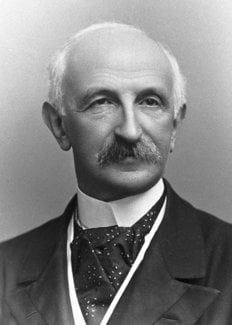Tobias Asser
Biographical

Tobias Michael Carel Asser (April 28, 1838-July 29, 1913) was born in Amsterdam into a family with a tradition in the field of law, both his father and his grandfather having been well-established lawyers and his uncle having served as the Dutch minister of justice. A brilliant student, young Asser won a competition in 1857 with his thesis On the Economic Conception of Value. Although this achievement may have confirmed an early decision to take up a career in the business world, he changed his mind and went on to study law at the Athenaeum in Amsterdam, taking a doctor’s degree in 1860 at the age of twenty-one. In that same year, the Dutch government appointed him a member of an international commission which was to negotiate the abolition of tolls on the Rhine River.
Asser practiced law for a brief period but devoted his life mainly to teaching, scholarship, and politics. In 1862 he accepted a teaching position at the Athenaeum as professor of private law; in 1876, when the institution became the University of Amsterdam, he continued as a professor of international and commercial law while continuing a reduced legal practice.
Early in his scholarly career, Asser turned to the problems of international law, dedicating himself particularly to the area of international private law in which he soon acquired a position of leadership. Believing that legal conflicts between nations could best be solved by international conferences which would agree on common solutions to be implemented by each participating nation, he persuaded the Dutch government to call several conferences of European powers to work out a codification of international private law. Attended by representatives of most of the countries of Europe, the first two of these conferences, held at The Hague in 1893 and 1894 and over which Asser presided, drew up a treaty, made effective in May, 1899, establishing a uniform international procedure for conducting civil trials. Asser also presided over the conferences of 1900 and 1904, which resulted in several important treaties governing international family law, including matters relating to marriage, divorce, legal separation, and guardianship of minors.
Asser’s interest in international law led him, along with the Belgian Gustave Rolin-Jaequemyns and the Englishman John Westlake, to found a journal of international law, Revue de droit international et de législation comparée in 1869. Four years later he was one of those invited by Rolin-Jaequemyns to take part in the small international conference at Ghent which founded the Institute of International Law, an organization which Asser later headed. Active in efforts to establish an academy of international law, Asser died before such an academy became a reality at The Hague in 1923.
Asser’s contributions to the literature of law were a vital part of his efforts. Among his more important works are Schets van het internationaal Privatrecht (1877) and Schets van het Nederlandsche Handelsrecht (1904).
Asser also participated in the practical politics of international affairs. He accepted a position as legal adviser to the Netherlands Ministry of Foreign Affairs in 1875; became a member of the Council of State, the highest administrative body in the government, in 1893; served as president of the State Commission for International Law beginning in 1898; acted as his country’s delegate to the Hague Peace Conferences of 1899 and 1907, there urging that the principle of compulsory arbitration be introduced in the economic area; held a post as minister without portfolio from 1904 until his death.
Noted as a negotiator, Asser was involved during this period from 1875 to 1913 in virtually every treaty concluded by the Dutch government. One of his triumphs was the securing of a seat for Spain and for The Netherlands beside France, England, Germany, Austria, Italy, Russia, and Turkey on the Suez Canal Commission, the body that drew up the Suez Canal Convention of 1888 guaranteeing the canal’s neutrality. Noted also as an arbiter of international disputes, he sat as a member of the Permanent Court of Arbitration that heard the first case to come before that court – the Pious Fund dispute between the United States and Mexico (1902).
Asser was an accomplished linguist, handling effectively the German, French, and English languages, as well as his native Dutch. For his scholarship and its application to the affairs of government he was awarded honorary degrees by the Universities of Edinburgh, Cambridge, Bologna, and Berlin. Housed in the Peace Palace at The Hague, a library of international law which he gathered with the help of contributions from twenty countries has been named «The Asser Collection».
| Selected Bibliography |
| Asser, Tobias M.C., La Convention de La Haye du 14 novembre 1896 relative à la procédure civile. Haarlem, Bohn, 1901. |
| Asser, Tobias M.C., Schets van het Internationaal Privantrecht. Haarlem, Bohn, 1877. |
| Asser, Tobias M.C., Schets van het Nederlandsche Handelsrecht. Haarlem, Bohn, 1904. |
| Asser, Tobias M.C., Studiën op het Gebied van Recht en Staat (1858-1888). Haarlem, Bohn, 1889. |
| Encyclopaedia Judaica. |
| «Der Nobelpreis 1911», in Die Friedens-Warte, 13 (December, 1911) 373-374. |
| «T.M.C. Asser », in American Journal of International Law, 8 (1914) 343-344. |
This autobiography/biography was written at the time of the award and first published in the book series Les Prix Nobel. It was later edited and republished in Nobel Lectures. To cite this document, always state the source as shown above.
The Nobel Foundation's copyright has expired.Nobel Prizes and laureates
Six prizes were awarded for achievements that have conferred the greatest benefit to humankind. The 14 laureates' work and discoveries range from quantum tunnelling to promoting democratic rights.
See them all presented here.
